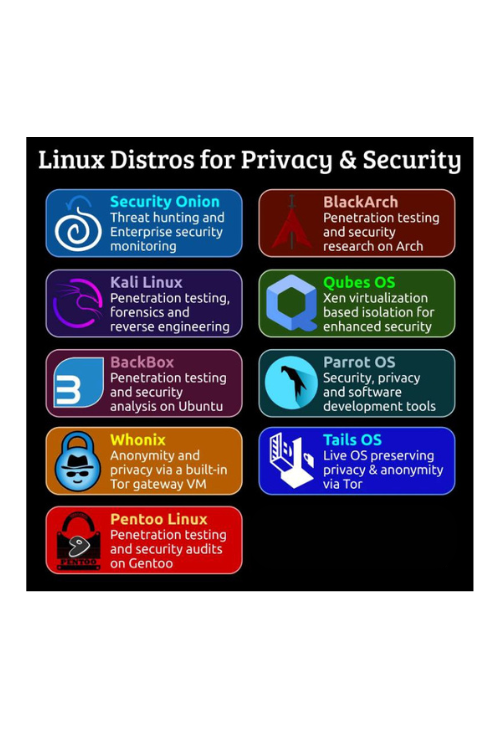Comprehensive Guide to Security-Focused Linux Distributions

In the realm of cybersecurity, specialized Linux distributions play a crucial role in providing robust platforms for various security tasks. This guide offers an in-depth look at some of the most popular security-focused Linux distributions, detailing their features, use cases, and unique characteristics.
1. Security Onion
Overview: Security Onion is a Linux distribution designed for threat hunting, enterprise security monitoring, and log management.
Key Features:
- Integrates numerous open-source security tools
- Includes intrusion detection systems (IDS) like Suricata and Zeek
- Offers powerful log management with the ELK stack (Elasticsearch, Logstash, Kibana)
Typical Use Cases:
- Network Security Monitoring (NSM)
- Incident response and threat hunting
- Compliance monitoring for large organizations
System Requirements:
- Minimum: 4 CPU cores, 8GB RAM, 200GB storage
- Recommended: 8+ CPU cores, 16GB+ RAM, 1TB+ storage
Update Frequency: Regular updates, typically monthly
Community Support:
- Active community forums
- Comprehensive documentation
- Regular training sessions and webinars
Learning Curve: Moderate to High. Best suited for security professionals with network monitoring experience.
Installation Method: ISO image for bare-metal or virtual machine installation
2. BlackArch Linux
Overview: BlackArch is an Arch Linux-based distribution focused on penetration testing and security research.
Key Features:
- Over 2,800 security and hacking tools
- Rolling release model ensures up-to-date tools
- Lightweight and customizable
Typical Use Cases:
- Ethical hacking and penetration testing
- Security research and vulnerability assessment
- CTF (Capture The Flag) competitions
System Requirements:
- Minimum: 2GB RAM, 20GB storage
- Recommended: 4GB+ RAM, 50GB+ storage
Update Frequency: Continuous updates (rolling release)
Community Support:
- Active IRC channel
- Extensive wiki documentation
- GitHub repository for issue tracking
Learning Curve: High. Requires familiarity with Arch Linux and command-line interfaces.
Installation Method: Live ISO, netinstall ISO, or as an overlay on existing Arch Linux installations
3. Kali Linux
Overview: Kali Linux is one of the most popular distributions for penetration testing, digital forensics, and reverse engineering.
Key Features:
- 600+ pre-installed penetration testing tools
- Fully customizable
- ARM architecture support
Typical Use Cases:
- Professional penetration testing
- Digital forensics investigations
- Security training and education
System Requirements:
- Minimum: 2GB RAM, 20GB storage
- Recommended: 4GB+ RAM, 50GB+ storage
Update Frequency: Rolling release with major version updates quarterly
Community Support:
- Extensive official documentation
- Large user community and forums
- Official training and certification programs
Learning Curve: Moderate. User-friendly for those familiar with Linux, but mastering all tools requires time.
Installation Method: Live USB/DVD, VMware/VirtualBox images, ARM images, cloud instances
4. Qubes OS
Overview: Qubes OS is a security-focused operating system that uses Xen-based virtualization to isolate different tasks and applications.
Key Features:
- Compartmentalization through multiple VMs
- Template-based VM creation for easy management
- Integration with Whonix for anonymous browsing
Typical Use Cases:
- High-security personal computing
- Segregation of work and personal activities
- Secure development environments
System Requirements:
- Minimum: 64-bit CPU with VT-x, 6GB RAM, 32GB storage
- Recommended: 16GB+ RAM, 128GB+ SSD
Update Frequency: Major releases approximately yearly, with regular security updates
Community Support:
- Detailed documentation
- Active user forums
- Mailing lists for users and developers
Learning Curve: High. Requires understanding of virtualization concepts and willingness to adapt workflow.
Installation Method: ISO image for bare-metal installation
5. BackBox
Overview: BackBox is an Ubuntu-based distribution tailored for penetration testing and security assessments.
Key Features:
- Ethical hacking and security audit tools
- Custom kernel with security patches
- Lightweight desktop environment
Typical Use Cases:
- Network and web application security testing
- Vulnerability assessments
- IT security training
System Requirements:
- Minimum: 2GB RAM, 20GB storage
- Recommended: 4GB+ RAM, 50GB+ storage
Update Frequency: New versions released every 6 months
Community Support:
- Community forums
- Wiki documentation
- Social media channels
Learning Curve: Moderate. Familiar interface for Ubuntu users, but requires security knowledge to utilize tools effectively.
Installation Method: Live USB/DVD or full installation
6. Parrot OS
Overview: Parrot OS is a security-oriented operating system based on Debian, suitable for security testing, software development, and privacy protection.
Key Features:
- Comprehensive set of security and development tools
- Lightweight and fast, even on older hardware
- Strong focus on privacy with built-in anonymity tools
Typical Use Cases:
- Penetration testing and vulnerability assessment
- Secure software development
- Anonymous browsing and communication
System Requirements:
- Minimum: 2GB RAM, 20GB storage
- Recommended: 4GB+ RAM, 50GB+ storage
Update Frequency: Rolling release with major version updates several times a year
Community Support:
- Active community forums
- Comprehensive wiki
- Social media and chat channels
Learning Curve: Moderate. User-friendly interface with options for both beginners and advanced users.
Installation Method: Live USB/DVD, full installation, cloud images
7. Whonix
Overview: Whonix is a Debian-based Linux distribution focused on anonymity, privacy, and security.
Key Features:
- All connections forced through Tor network
- Two-VM architecture separating the Tor gateway from the workstation
- Designed to run as a VM inside a host OS for added security
Typical Use Cases:
- Anonymous internet browsing and communication
- Secure OS for whistleblowers and journalists
- Testing and development in an anonymous environment
System Requirements:
- Minimum: 2GB RAM, 20GB storage
- Recommended: 4GB+ RAM, 50GB+ storage
Update Frequency: Regular updates following Debian's schedule
Community Support:
- Extensive documentation
- User forums and wiki
- Dedicated subreddit
Learning Curve: Moderate to High. Requires understanding of Tor and virtualization concepts.
Installation Method: Pre-built images for popular virtualization platforms
8. Tails OS
Overview: Tails (The Amnesic Incognito Live System) is a live operating system aimed at preserving privacy and anonymity.
Key Features:
- Boots from USB stick or DVD
- All internet traffic routed through Tor
- Leaves no digital footprint on the host computer
Typical Use Cases:
- Anonymous internet browsing
- Secure communication for journalists and activists
- Bypassing censorship in restrictive environments
System Requirements:
- Minimum: 2GB RAM, 8GB USB stick/DVD
- Recommended: 4GB+ RAM, 16GB+ USB stick
Update Frequency: New versions released approximately every six weeks
Community Support:
- Detailed guides and documentation
- Support chat and forums
- Whisperback feature for anonymous bug reporting
Learning Curve: Low to Moderate. Designed to be user-friendly, but some Tor knowledge is beneficial.
Installation Method: Live USB/DVD only, persistent storage option available
9. Pentoo Linux
Overview: Pentoo is a Gentoo-based Linux distribution focused on penetration testing and security assessment.
Key Features:
- Based on Gentoo's Hardened profile for enhanced security
- Includes numerous penetration testing and security audit tools
- Custom kernel with grsecurity/PaX patches
Typical Use Cases:
- Advanced penetration testing
- Wireless network auditing
- Custom security tool development
System Requirements:
- Minimum: 2GB RAM, 20GB storage
- Recommended: 4GB+ RAM, 50GB+ storage
Update Frequency: Rolling release with frequent updates
Community Support:
- IRC channel
- Bug tracker on GitHub
- Wiki documentation
Learning Curve: High. Requires good understanding of Linux and Gentoo in particular.
Installation Method: Live USB/DVD, option to install as Gentoo overlay
Comparison Table
| Distribution | Focus | Base | Update Model | Learning Curve |
|---|---|---|---|---|
| Security Onion | Network Monitoring | Ubuntu | Regular | Moderate-High |
| BlackArch | Penetration Testing | Arch | Rolling | High |
| Kali Linux | Penetration Testing | Debian | Rolling | Moderate |
| Qubes OS | Isolation/Compartmentalization | Fedora | Yearly | High |
| BackBox | Security Assessment | Ubuntu | Semi-Annual | Moderate |
| Parrot OS | Security & Development | Debian | Rolling | Moderate |
| Whonix | Anonymity | Debian | Regular | Moderate-High |
| Tails OS | Privacy/Anonymity | Debian | Six-Weekly | Low-Moderate |
| Pentoo | Penetration Testing | Gentoo | Rolling | High |
This guide provides a comprehensive overview of popular security-focused Linux distributions. When choosing a distribution, consider your specific needs, technical expertise, and the particular security tasks you aim to accomplish. Remember that the effectiveness of these tools largely depends on the user's knowledge and skills in the cybersecurity domain.
Additional Privacy-Focused Linux Distributions
In addition to the security-focused distributions we've already covered, here are some more Linux distributions that place a strong emphasis on privacy:
1. PureOS
Overview: PureOS is a fully free, ethical, and privacy-respecting distribution developed by Purism.
Key Features:
- Completely free and open-source software (FOSS)
- Pre-installed with privacy-respecting applications
- Wayland display server for improved security
- Uses LibreOffice instead of proprietary office suites
Typical Use Cases:
- Daily computing with a focus on privacy
- Ethical computing and digital rights advocacy
Update Frequency: Rolling release
Learning Curve: Low to Moderate. Designed to be user-friendly for those familiar with GNOME.
2. Kodachi
Overview: Kodachi is a Debian-based distribution focused on privacy, security, and anonymity.
Key Features:
- Routes all connections through VPN and Tor
- Includes cryptocurrency wallets for anonymous transactions
- Anti-forensics tools and self-destruction options
- Built-in password manager and file encryptor
Typical Use Cases:
- Anonymous internet browsing and communication
- Secure financial transactions
- Privacy-focused daily computing
Update Frequency: Regular updates, typically every few months
Learning Curve: Moderate. Requires some understanding of privacy tools and concepts.
3. Subgraph OS
Overview: Subgraph OS is designed to resist network-borne exploits and attacks.
Key Features:
- Kernel hardening and mandatory access controls
- Application sandboxing
- Tor integration for anonymous communication
- Encrypted messaging and email applications pre-installed
Typical Use Cases:
- Secure computing in high-risk environments
- Protection against advanced persistent threats
Update Frequency: Infrequent (Note: Development appears to have slowed recently)
Learning Curve: High. Best suited for users with advanced security knowledge.
4. Heads
Overview: Heads is a privacy-focused distribution based on Devuan, with all binary blobs removed from the Linux kernel.
Key Features:
- Completely libre Linux kernel
- Uses tor for all outgoing connections
- Includes tools for anonymous file sharing and communication
- Diskless system that runs entirely from RAM
Typical Use Cases:
- Highly secure and anonymous computing
- Live system for privacy-critical tasks
Update Frequency: Infrequent updates
Learning Curve: High. Requires significant Linux expertise and comfort with command-line interfaces.
5. Alpine Linux
Overview: While not exclusively focused on privacy, Alpine is known for its security-oriented, lightweight nature.
Key Features:
- Minimal base system with a focus on security
- Uses musl libc and busybox utilities
- Popular for containerized applications due to small footprint
Typical Use Cases:
- Secure server deployments
- Base for building custom, security-focused systems
Update Frequency: Regular releases, typically every 6 months
Learning Curve: High. Primarily designed for experienced users and developers.
These additional distributions further expand the options available for privacy-conscious users. Each offers a unique approach to privacy and security, catering to different use cases and user expertise levels. When choosing a distribution, consider factors such as your technical skills, specific privacy needs, and the level of anonymity required for your use case.





